Water Ethics in Environmental and Resource Management: A Report
VerifiedAdded on 2023/01/19
|11
|2181
|43
Report
AI Summary
This report delves into the principles of environmental and resource management, with a specific focus on water ethics. It explores the critical importance of water as a vital resource, addressing issues such as pollution, conflicts arising from water scarcity, and the impact of human activities on water quality and availability. The report examines current pollution control policies, particularly in the context of Lake Eyre, and evaluates the effects of privatization and globalization on water management. It highlights the need for stakeholder involvement in decision-making, considering the values and ethics of communities, and offers recommendations for sustainable water use, including land access policies, community empowerment, and the enforcement of ethical guidelines. The report emphasizes the importance of understanding water as a basic human right and the need for policies that address both access and equitable usage to prevent conflicts and promote environmental sustainability. The report also emphasizes the need for effective management, conservation, and ethical considerations in the use of water resources, particularly in Australia, considering diverse stakeholder perspectives and the integration of community values in decision-making processes.
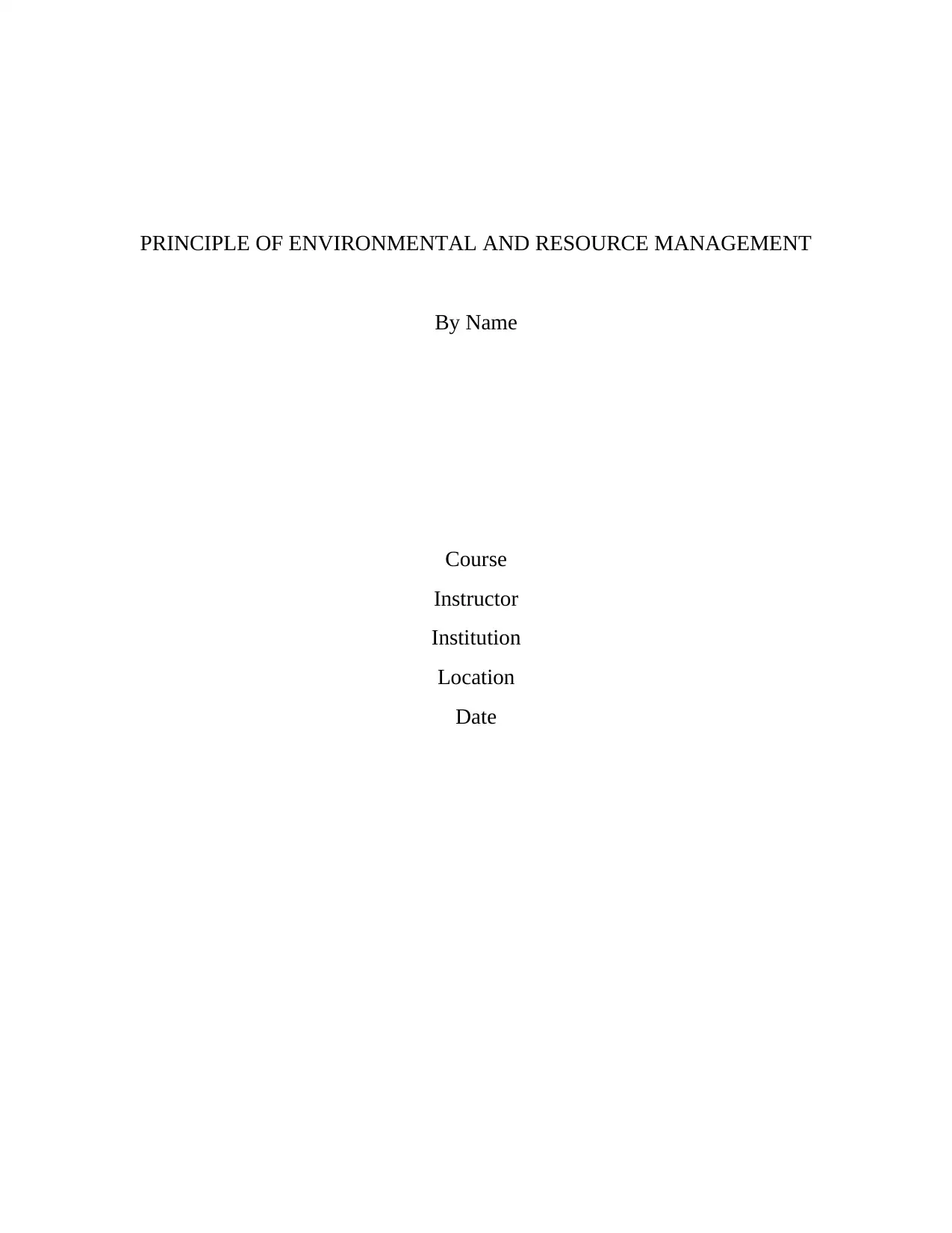
PRINCIPLE OF ENVIRONMENTAL AND RESOURCE MANAGEMENT
By Name
Course
Instructor
Institution
Location
Date
By Name
Course
Instructor
Institution
Location
Date
Paraphrase This Document
Need a fresh take? Get an instant paraphrase of this document with our AI Paraphraser
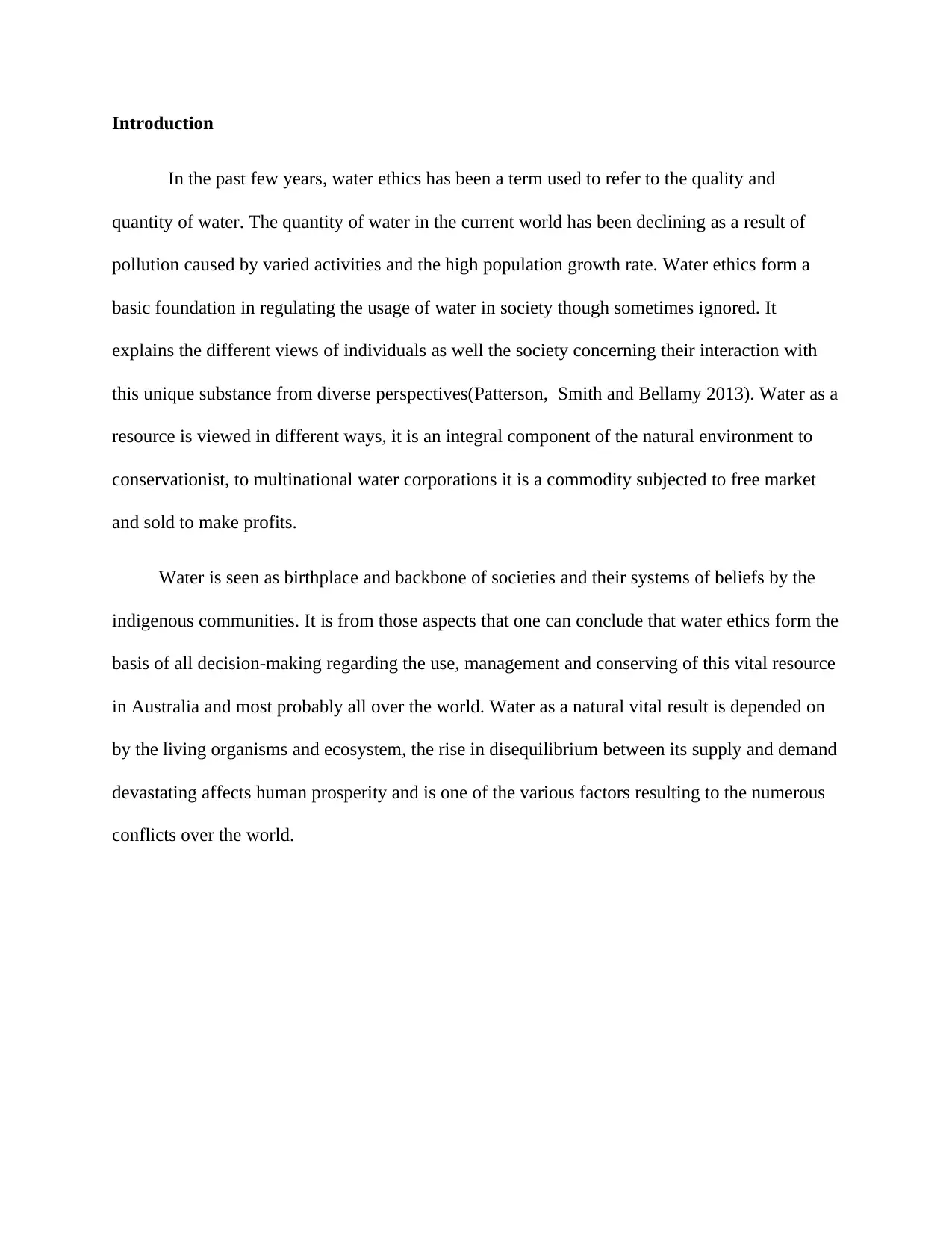
Introduction
In the past few years, water ethics has been a term used to refer to the quality and
quantity of water. The quantity of water in the current world has been declining as a result of
pollution caused by varied activities and the high population growth rate. Water ethics form a
basic foundation in regulating the usage of water in society though sometimes ignored. It
explains the different views of individuals as well the society concerning their interaction with
this unique substance from diverse perspectives(Patterson, Smith and Bellamy 2013). Water as a
resource is viewed in different ways, it is an integral component of the natural environment to
conservationist, to multinational water corporations it is a commodity subjected to free market
and sold to make profits.
Water is seen as birthplace and backbone of societies and their systems of beliefs by the
indigenous communities. It is from those aspects that one can conclude that water ethics form the
basis of all decision-making regarding the use, management and conserving of this vital resource
in Australia and most probably all over the world. Water as a natural vital result is depended on
by the living organisms and ecosystem, the rise in disequilibrium between its supply and demand
devastating affects human prosperity and is one of the various factors resulting to the numerous
conflicts over the world.
In the past few years, water ethics has been a term used to refer to the quality and
quantity of water. The quantity of water in the current world has been declining as a result of
pollution caused by varied activities and the high population growth rate. Water ethics form a
basic foundation in regulating the usage of water in society though sometimes ignored. It
explains the different views of individuals as well the society concerning their interaction with
this unique substance from diverse perspectives(Patterson, Smith and Bellamy 2013). Water as a
resource is viewed in different ways, it is an integral component of the natural environment to
conservationist, to multinational water corporations it is a commodity subjected to free market
and sold to make profits.
Water is seen as birthplace and backbone of societies and their systems of beliefs by the
indigenous communities. It is from those aspects that one can conclude that water ethics form the
basis of all decision-making regarding the use, management and conserving of this vital resource
in Australia and most probably all over the world. Water as a natural vital result is depended on
by the living organisms and ecosystem, the rise in disequilibrium between its supply and demand
devastating affects human prosperity and is one of the various factors resulting to the numerous
conflicts over the world.
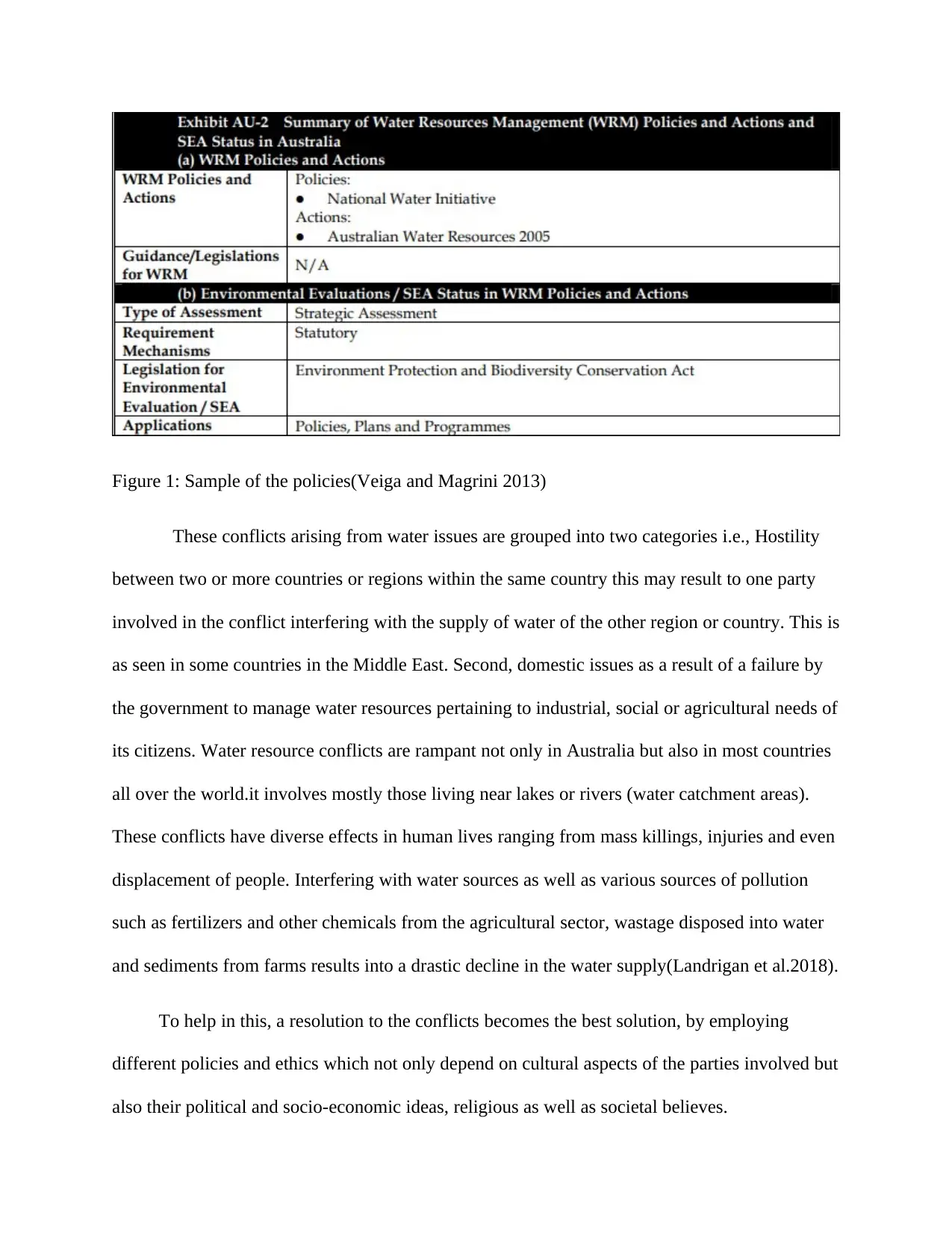
Figure 1: Sample of the policies(Veiga and Magrini 2013)
These conflicts arising from water issues are grouped into two categories i.e., Hostility
between two or more countries or regions within the same country this may result to one party
involved in the conflict interfering with the supply of water of the other region or country. This is
as seen in some countries in the Middle East. Second, domestic issues as a result of a failure by
the government to manage water resources pertaining to industrial, social or agricultural needs of
its citizens. Water resource conflicts are rampant not only in Australia but also in most countries
all over the world.it involves mostly those living near lakes or rivers (water catchment areas).
These conflicts have diverse effects in human lives ranging from mass killings, injuries and even
displacement of people. Interfering with water sources as well as various sources of pollution
such as fertilizers and other chemicals from the agricultural sector, wastage disposed into water
and sediments from farms results into a drastic decline in the water supply(Landrigan et al.2018).
To help in this, a resolution to the conflicts becomes the best solution, by employing
different policies and ethics which not only depend on cultural aspects of the parties involved but
also their political and socio-economic ideas, religious as well as societal believes.
These conflicts arising from water issues are grouped into two categories i.e., Hostility
between two or more countries or regions within the same country this may result to one party
involved in the conflict interfering with the supply of water of the other region or country. This is
as seen in some countries in the Middle East. Second, domestic issues as a result of a failure by
the government to manage water resources pertaining to industrial, social or agricultural needs of
its citizens. Water resource conflicts are rampant not only in Australia but also in most countries
all over the world.it involves mostly those living near lakes or rivers (water catchment areas).
These conflicts have diverse effects in human lives ranging from mass killings, injuries and even
displacement of people. Interfering with water sources as well as various sources of pollution
such as fertilizers and other chemicals from the agricultural sector, wastage disposed into water
and sediments from farms results into a drastic decline in the water supply(Landrigan et al.2018).
To help in this, a resolution to the conflicts becomes the best solution, by employing
different policies and ethics which not only depend on cultural aspects of the parties involved but
also their political and socio-economic ideas, religious as well as societal believes.
⊘ This is a preview!⊘
Do you want full access?
Subscribe today to unlock all pages.

Trusted by 1+ million students worldwide
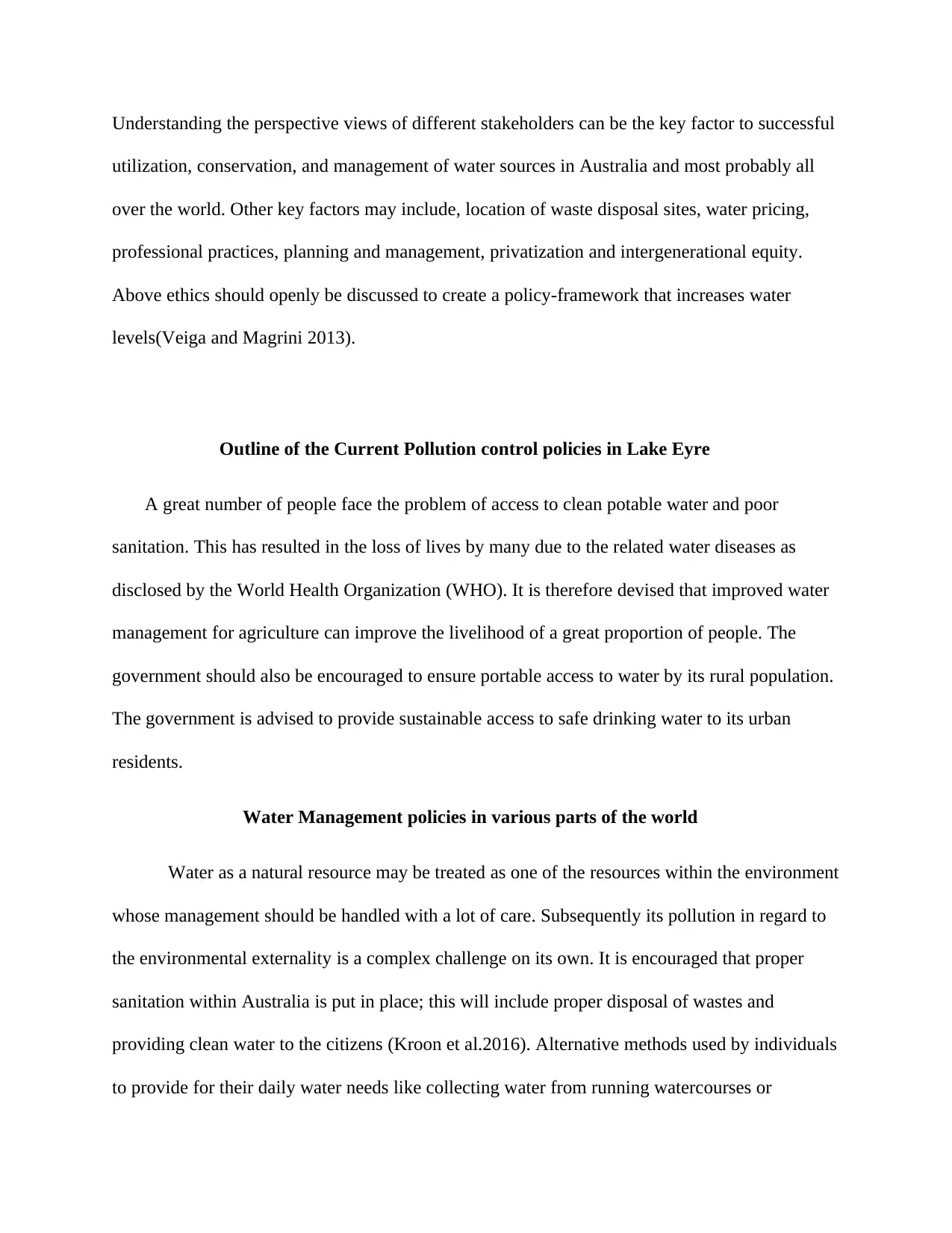
Understanding the perspective views of different stakeholders can be the key factor to successful
utilization, conservation, and management of water sources in Australia and most probably all
over the world. Other key factors may include, location of waste disposal sites, water pricing,
professional practices, planning and management, privatization and intergenerational equity.
Above ethics should openly be discussed to create a policy-framework that increases water
levels(Veiga and Magrini 2013).
Outline of the Current Pollution control policies in Lake Eyre
A great number of people face the problem of access to clean potable water and poor
sanitation. This has resulted in the loss of lives by many due to the related water diseases as
disclosed by the World Health Organization (WHO). It is therefore devised that improved water
management for agriculture can improve the livelihood of a great proportion of people. The
government should also be encouraged to ensure portable access to water by its rural population.
The government is advised to provide sustainable access to safe drinking water to its urban
residents.
Water Management policies in various parts of the world
Water as a natural resource may be treated as one of the resources within the environment
whose management should be handled with a lot of care. Subsequently its pollution in regard to
the environmental externality is a complex challenge on its own. It is encouraged that proper
sanitation within Australia is put in place; this will include proper disposal of wastes and
providing clean water to the citizens (Kroon et al.2016). Alternative methods used by individuals
to provide for their daily water needs like collecting water from running watercourses or
utilization, conservation, and management of water sources in Australia and most probably all
over the world. Other key factors may include, location of waste disposal sites, water pricing,
professional practices, planning and management, privatization and intergenerational equity.
Above ethics should openly be discussed to create a policy-framework that increases water
levels(Veiga and Magrini 2013).
Outline of the Current Pollution control policies in Lake Eyre
A great number of people face the problem of access to clean potable water and poor
sanitation. This has resulted in the loss of lives by many due to the related water diseases as
disclosed by the World Health Organization (WHO). It is therefore devised that improved water
management for agriculture can improve the livelihood of a great proportion of people. The
government should also be encouraged to ensure portable access to water by its rural population.
The government is advised to provide sustainable access to safe drinking water to its urban
residents.
Water Management policies in various parts of the world
Water as a natural resource may be treated as one of the resources within the environment
whose management should be handled with a lot of care. Subsequently its pollution in regard to
the environmental externality is a complex challenge on its own. It is encouraged that proper
sanitation within Australia is put in place; this will include proper disposal of wastes and
providing clean water to the citizens (Kroon et al.2016). Alternative methods used by individuals
to provide for their daily water needs like collecting water from running watercourses or
Paraphrase This Document
Need a fresh take? Get an instant paraphrase of this document with our AI Paraphraser
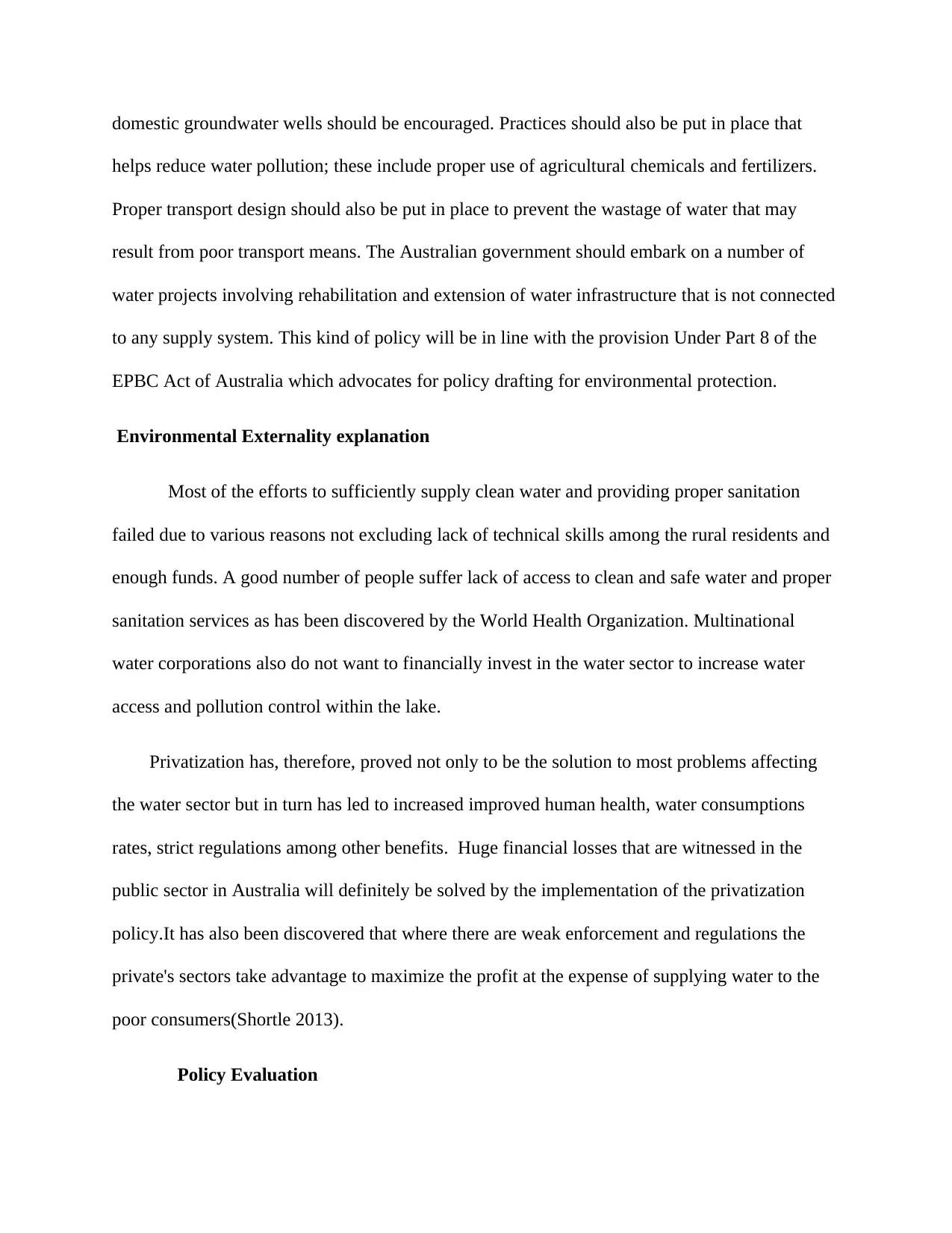
domestic groundwater wells should be encouraged. Practices should also be put in place that
helps reduce water pollution; these include proper use of agricultural chemicals and fertilizers.
Proper transport design should also be put in place to prevent the wastage of water that may
result from poor transport means. The Australian government should embark on a number of
water projects involving rehabilitation and extension of water infrastructure that is not connected
to any supply system. This kind of policy will be in line with the provision Under Part 8 of the
EPBC Act of Australia which advocates for policy drafting for environmental protection.
Environmental Externality explanation
Most of the efforts to sufficiently supply clean water and providing proper sanitation
failed due to various reasons not excluding lack of technical skills among the rural residents and
enough funds. A good number of people suffer lack of access to clean and safe water and proper
sanitation services as has been discovered by the World Health Organization. Multinational
water corporations also do not want to financially invest in the water sector to increase water
access and pollution control within the lake.
Privatization has, therefore, proved not only to be the solution to most problems affecting
the water sector but in turn has led to increased improved human health, water consumptions
rates, strict regulations among other benefits. Huge financial losses that are witnessed in the
public sector in Australia will definitely be solved by the implementation of the privatization
policy.It has also been discovered that where there are weak enforcement and regulations the
private's sectors take advantage to maximize the profit at the expense of supplying water to the
poor consumers(Shortle 2013).
Policy Evaluation
helps reduce water pollution; these include proper use of agricultural chemicals and fertilizers.
Proper transport design should also be put in place to prevent the wastage of water that may
result from poor transport means. The Australian government should embark on a number of
water projects involving rehabilitation and extension of water infrastructure that is not connected
to any supply system. This kind of policy will be in line with the provision Under Part 8 of the
EPBC Act of Australia which advocates for policy drafting for environmental protection.
Environmental Externality explanation
Most of the efforts to sufficiently supply clean water and providing proper sanitation
failed due to various reasons not excluding lack of technical skills among the rural residents and
enough funds. A good number of people suffer lack of access to clean and safe water and proper
sanitation services as has been discovered by the World Health Organization. Multinational
water corporations also do not want to financially invest in the water sector to increase water
access and pollution control within the lake.
Privatization has, therefore, proved not only to be the solution to most problems affecting
the water sector but in turn has led to increased improved human health, water consumptions
rates, strict regulations among other benefits. Huge financial losses that are witnessed in the
public sector in Australia will definitely be solved by the implementation of the privatization
policy.It has also been discovered that where there are weak enforcement and regulations the
private's sectors take advantage to maximize the profit at the expense of supplying water to the
poor consumers(Shortle 2013).
Policy Evaluation
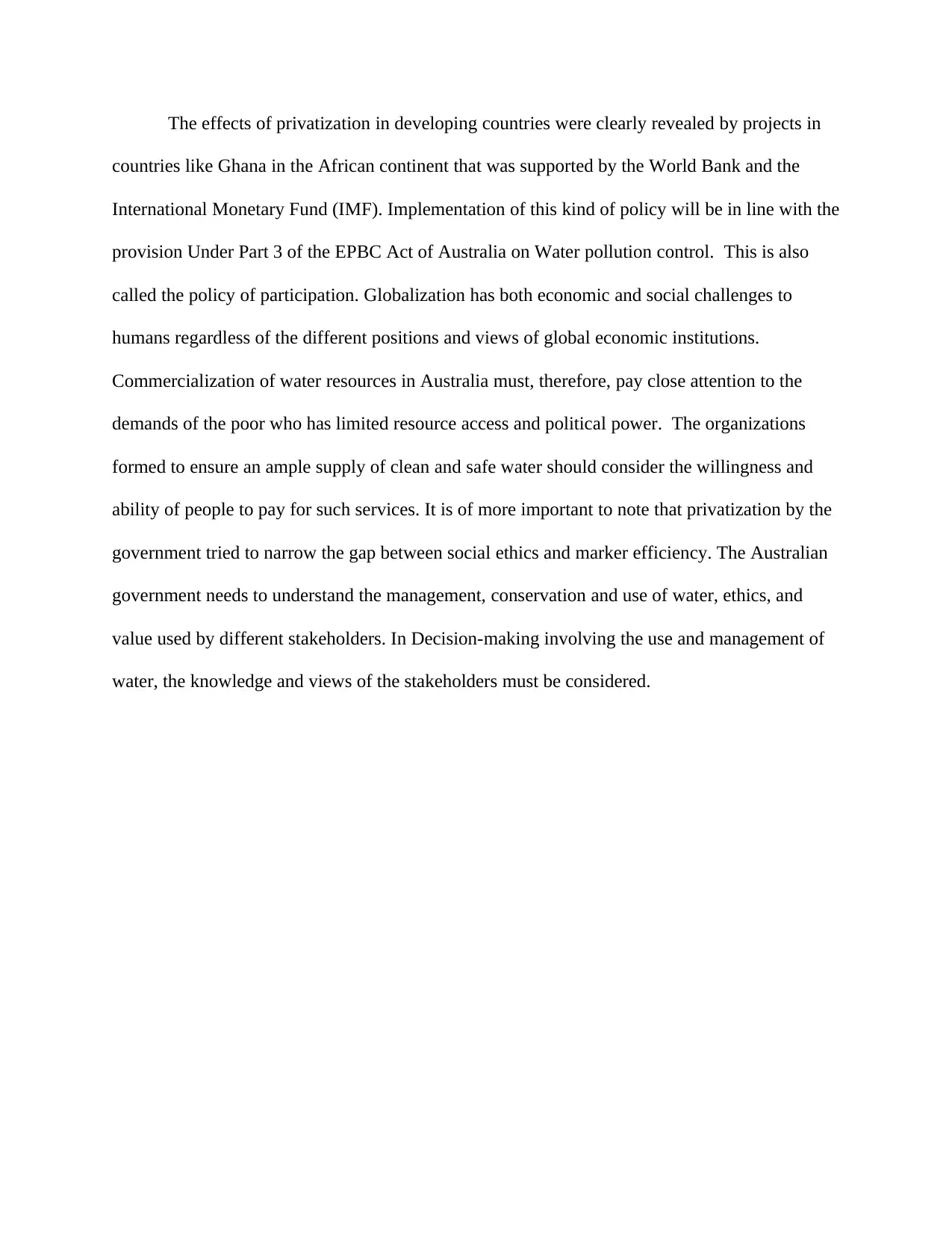
The effects of privatization in developing countries were clearly revealed by projects in
countries like Ghana in the African continent that was supported by the World Bank and the
International Monetary Fund (IMF). Implementation of this kind of policy will be in line with the
provision Under Part 3 of the EPBC Act of Australia on Water pollution control. This is also
called the policy of participation. Globalization has both economic and social challenges to
humans regardless of the different positions and views of global economic institutions.
Commercialization of water resources in Australia must, therefore, pay close attention to the
demands of the poor who has limited resource access and political power. The organizations
formed to ensure an ample supply of clean and safe water should consider the willingness and
ability of people to pay for such services. It is of more important to note that privatization by the
government tried to narrow the gap between social ethics and marker efficiency. The Australian
government needs to understand the management, conservation and use of water, ethics, and
value used by different stakeholders. In Decision-making involving the use and management of
water, the knowledge and views of the stakeholders must be considered.
countries like Ghana in the African continent that was supported by the World Bank and the
International Monetary Fund (IMF). Implementation of this kind of policy will be in line with the
provision Under Part 3 of the EPBC Act of Australia on Water pollution control. This is also
called the policy of participation. Globalization has both economic and social challenges to
humans regardless of the different positions and views of global economic institutions.
Commercialization of water resources in Australia must, therefore, pay close attention to the
demands of the poor who has limited resource access and political power. The organizations
formed to ensure an ample supply of clean and safe water should consider the willingness and
ability of people to pay for such services. It is of more important to note that privatization by the
government tried to narrow the gap between social ethics and marker efficiency. The Australian
government needs to understand the management, conservation and use of water, ethics, and
value used by different stakeholders. In Decision-making involving the use and management of
water, the knowledge and views of the stakeholders must be considered.
⊘ This is a preview!⊘
Do you want full access?
Subscribe today to unlock all pages.

Trusted by 1+ million students worldwide
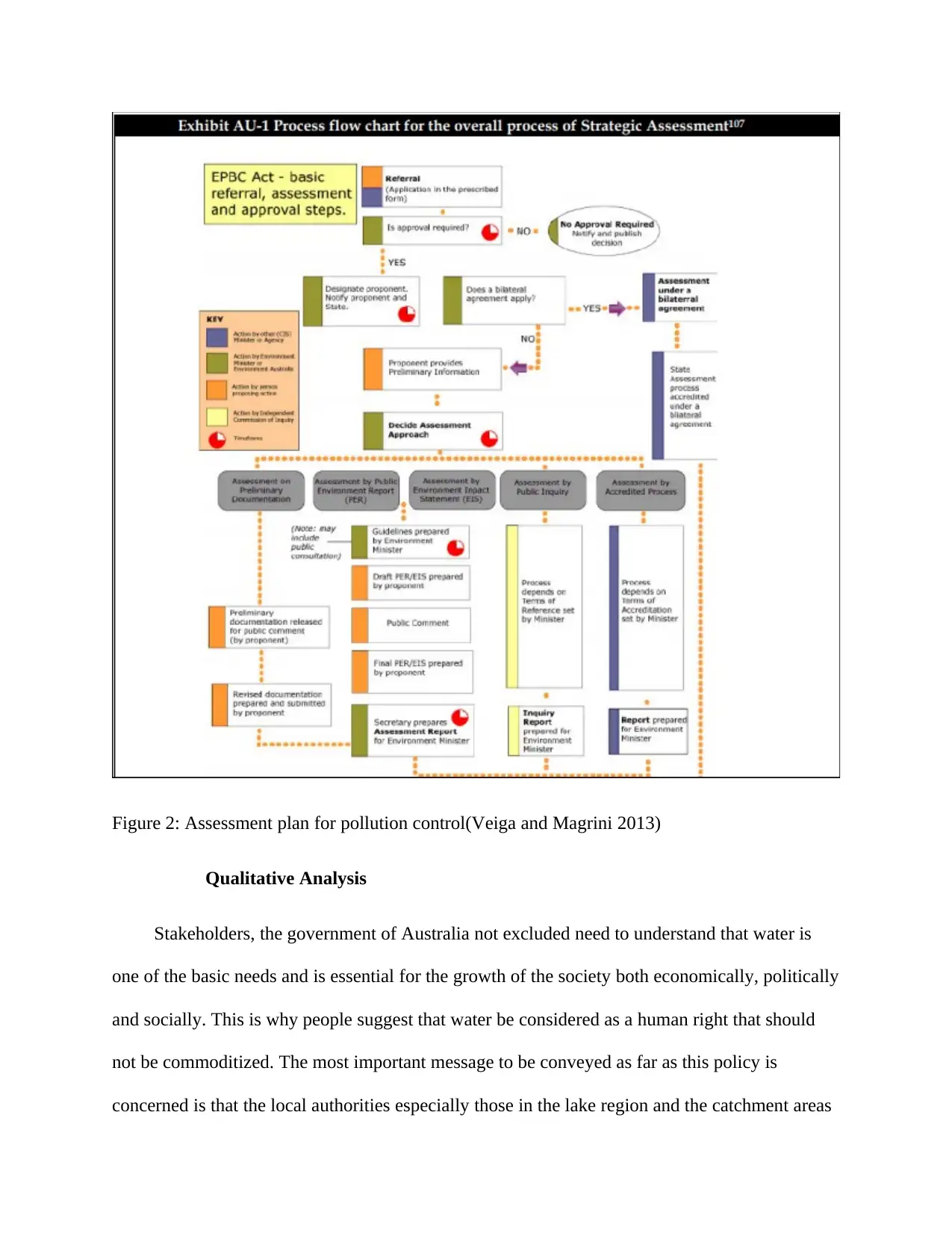
Figure 2: Assessment plan for pollution control(Veiga and Magrini 2013)
Qualitative Analysis
Stakeholders, the government of Australia not excluded need to understand that water is
one of the basic needs and is essential for the growth of the society both economically, politically
and socially. This is why people suggest that water be considered as a human right that should
not be commoditized. The most important message to be conveyed as far as this policy is
concerned is that the local authorities especially those in the lake region and the catchment areas
Qualitative Analysis
Stakeholders, the government of Australia not excluded need to understand that water is
one of the basic needs and is essential for the growth of the society both economically, politically
and socially. This is why people suggest that water be considered as a human right that should
not be commoditized. The most important message to be conveyed as far as this policy is
concerned is that the local authorities especially those in the lake region and the catchment areas
Paraphrase This Document
Need a fresh take? Get an instant paraphrase of this document with our AI Paraphraser
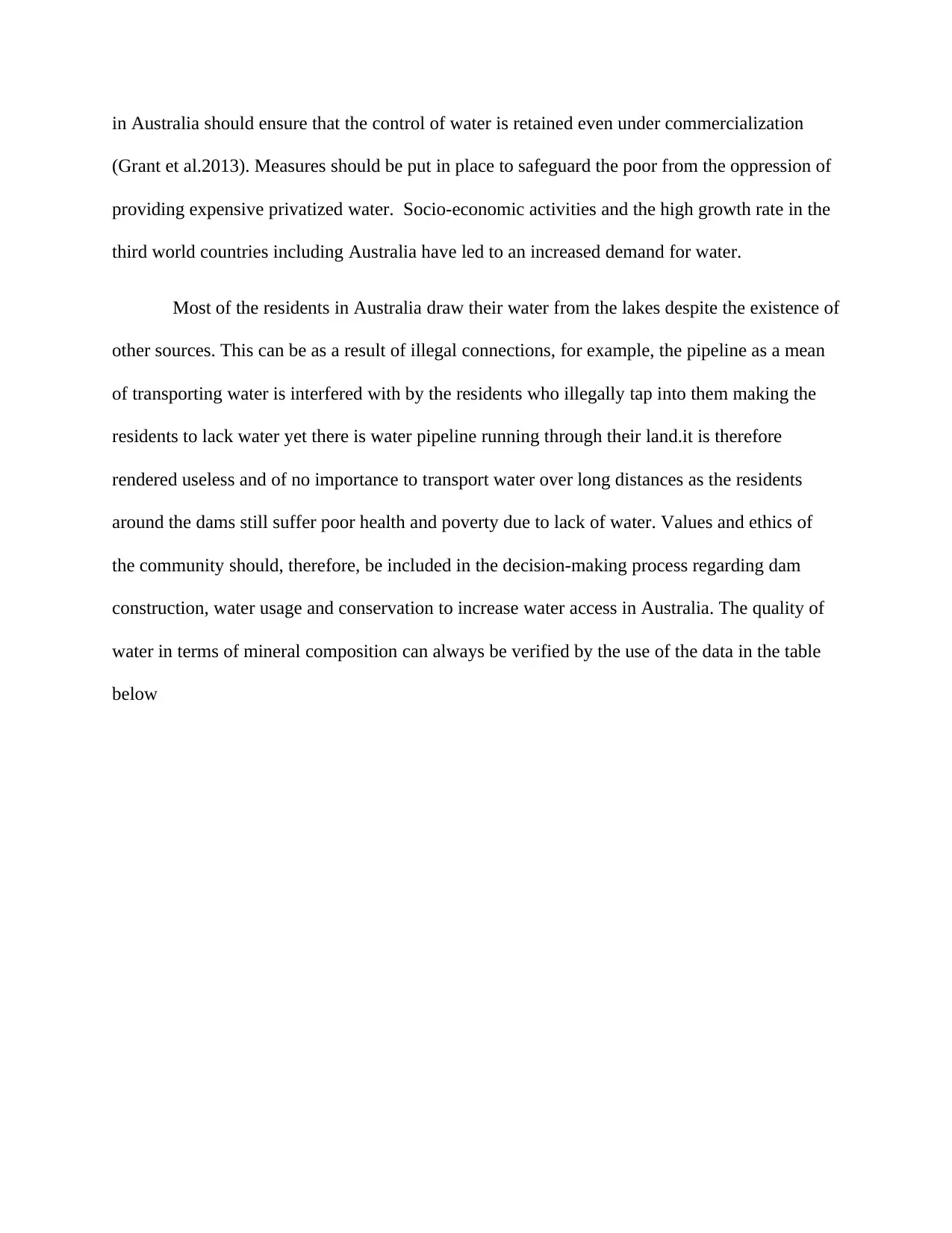
in Australia should ensure that the control of water is retained even under commercialization
(Grant et al.2013). Measures should be put in place to safeguard the poor from the oppression of
providing expensive privatized water. Socio-economic activities and the high growth rate in the
third world countries including Australia have led to an increased demand for water.
Most of the residents in Australia draw their water from the lakes despite the existence of
other sources. This can be as a result of illegal connections, for example, the pipeline as a mean
of transporting water is interfered with by the residents who illegally tap into them making the
residents to lack water yet there is water pipeline running through their land.it is therefore
rendered useless and of no importance to transport water over long distances as the residents
around the dams still suffer poor health and poverty due to lack of water. Values and ethics of
the community should, therefore, be included in the decision-making process regarding dam
construction, water usage and conservation to increase water access in Australia. The quality of
water in terms of mineral composition can always be verified by the use of the data in the table
below
(Grant et al.2013). Measures should be put in place to safeguard the poor from the oppression of
providing expensive privatized water. Socio-economic activities and the high growth rate in the
third world countries including Australia have led to an increased demand for water.
Most of the residents in Australia draw their water from the lakes despite the existence of
other sources. This can be as a result of illegal connections, for example, the pipeline as a mean
of transporting water is interfered with by the residents who illegally tap into them making the
residents to lack water yet there is water pipeline running through their land.it is therefore
rendered useless and of no importance to transport water over long distances as the residents
around the dams still suffer poor health and poverty due to lack of water. Values and ethics of
the community should, therefore, be included in the decision-making process regarding dam
construction, water usage and conservation to increase water access in Australia. The quality of
water in terms of mineral composition can always be verified by the use of the data in the table
below
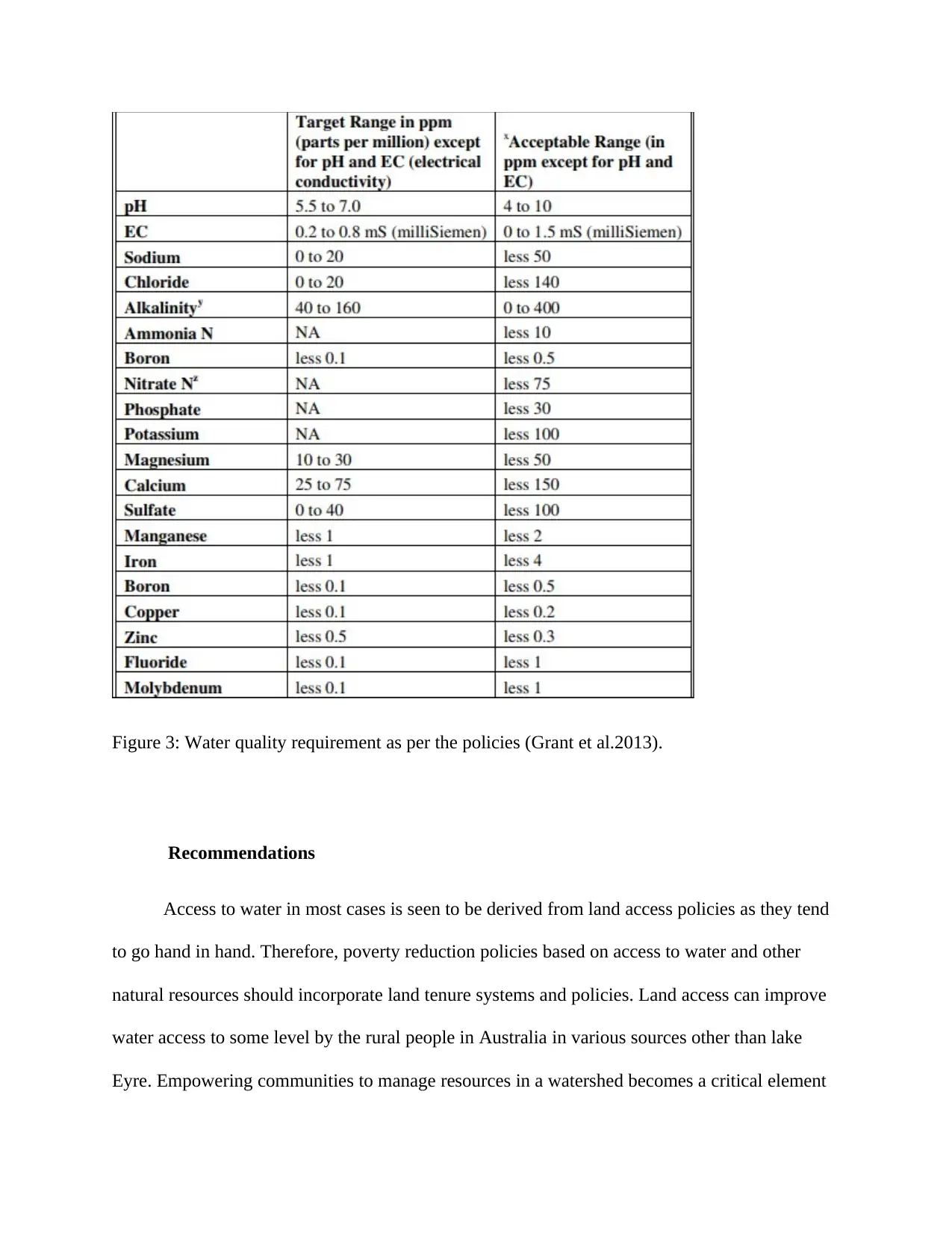
Figure 3: Water quality requirement as per the policies (Grant et al.2013).
Recommendations
Access to water in most cases is seen to be derived from land access policies as they tend
to go hand in hand. Therefore, poverty reduction policies based on access to water and other
natural resources should incorporate land tenure systems and policies. Land access can improve
water access to some level by the rural people in Australia in various sources other than lake
Eyre. Empowering communities to manage resources in a watershed becomes a critical element
Recommendations
Access to water in most cases is seen to be derived from land access policies as they tend
to go hand in hand. Therefore, poverty reduction policies based on access to water and other
natural resources should incorporate land tenure systems and policies. Land access can improve
water access to some level by the rural people in Australia in various sources other than lake
Eyre. Empowering communities to manage resources in a watershed becomes a critical element
⊘ This is a preview!⊘
Do you want full access?
Subscribe today to unlock all pages.

Trusted by 1+ million students worldwide
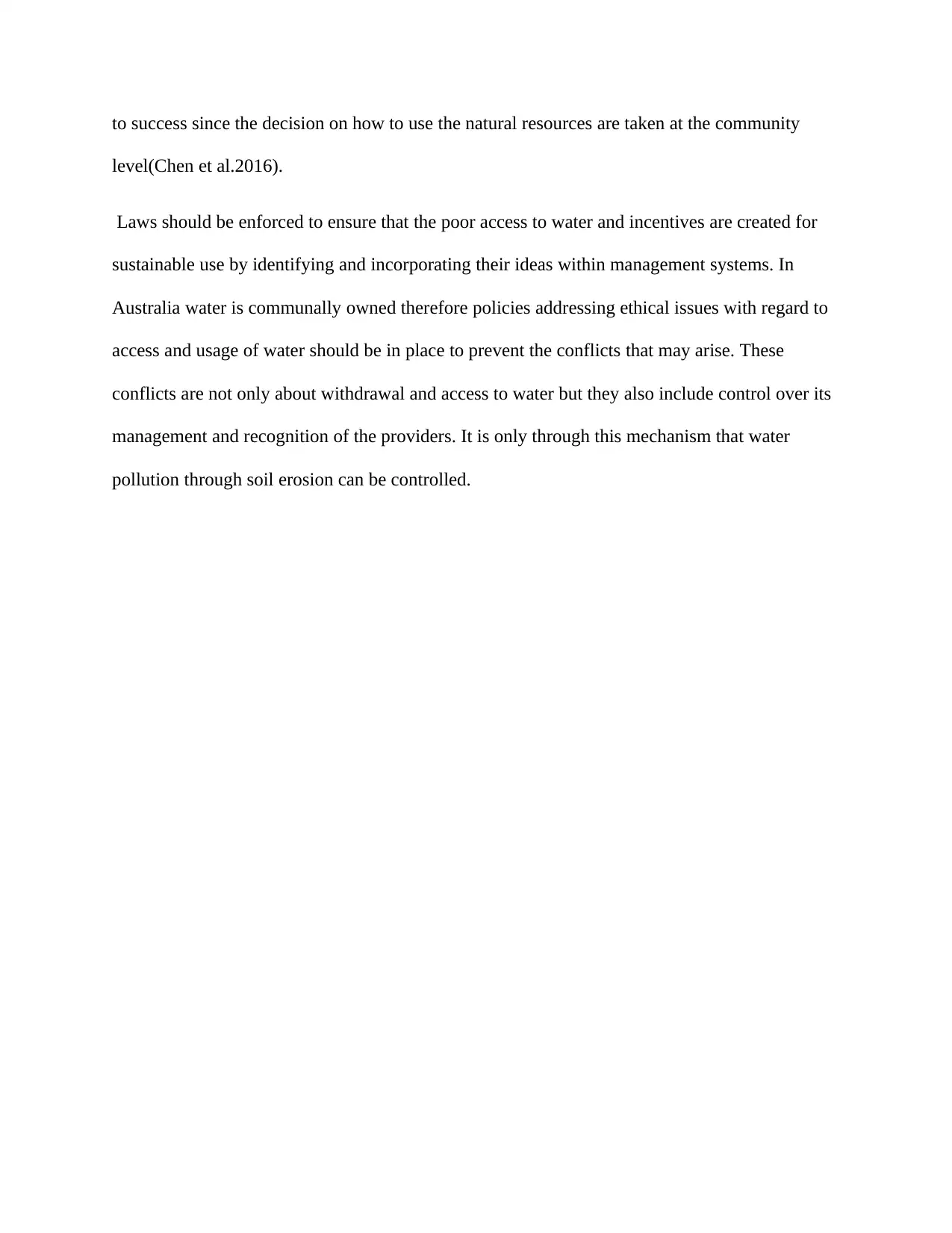
to success since the decision on how to use the natural resources are taken at the community
level(Chen et al.2016).
Laws should be enforced to ensure that the poor access to water and incentives are created for
sustainable use by identifying and incorporating their ideas within management systems. In
Australia water is communally owned therefore policies addressing ethical issues with regard to
access and usage of water should be in place to prevent the conflicts that may arise. These
conflicts are not only about withdrawal and access to water but they also include control over its
management and recognition of the providers. It is only through this mechanism that water
pollution through soil erosion can be controlled.
level(Chen et al.2016).
Laws should be enforced to ensure that the poor access to water and incentives are created for
sustainable use by identifying and incorporating their ideas within management systems. In
Australia water is communally owned therefore policies addressing ethical issues with regard to
access and usage of water should be in place to prevent the conflicts that may arise. These
conflicts are not only about withdrawal and access to water but they also include control over its
management and recognition of the providers. It is only through this mechanism that water
pollution through soil erosion can be controlled.
Paraphrase This Document
Need a fresh take? Get an instant paraphrase of this document with our AI Paraphraser
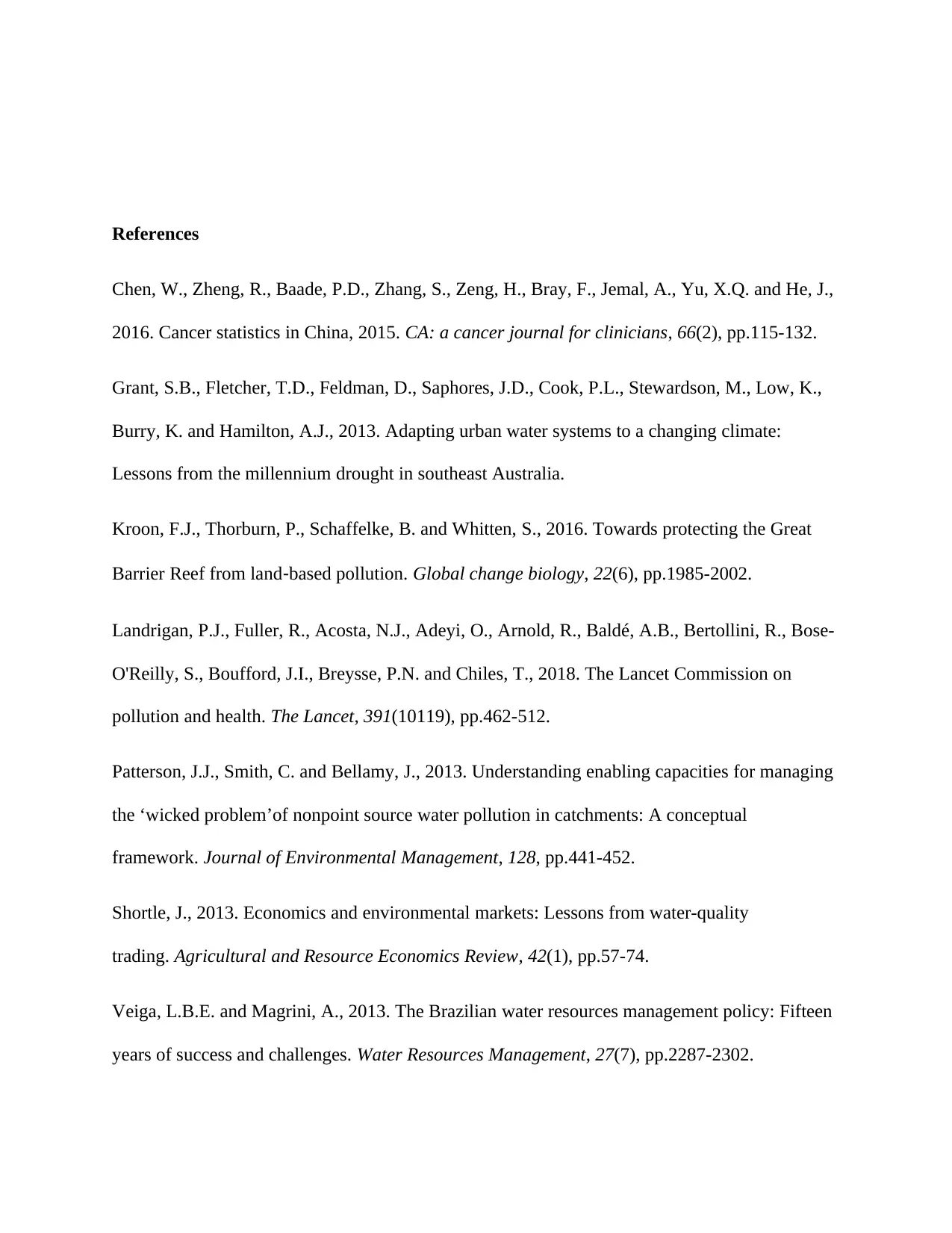
References
Chen, W., Zheng, R., Baade, P.D., Zhang, S., Zeng, H., Bray, F., Jemal, A., Yu, X.Q. and He, J.,
2016. Cancer statistics in China, 2015. CA: a cancer journal for clinicians, 66(2), pp.115-132.
Grant, S.B., Fletcher, T.D., Feldman, D., Saphores, J.D., Cook, P.L., Stewardson, M., Low, K.,
Burry, K. and Hamilton, A.J., 2013. Adapting urban water systems to a changing climate:
Lessons from the millennium drought in southeast Australia.
Kroon, F.J., Thorburn, P., Schaffelke, B. and Whitten, S., 2016. Towards protecting the Great
Barrier Reef from land‐based pollution. Global change biology, 22(6), pp.1985-2002.
Landrigan, P.J., Fuller, R., Acosta, N.J., Adeyi, O., Arnold, R., Baldé, A.B., Bertollini, R., Bose-
O'Reilly, S., Boufford, J.I., Breysse, P.N. and Chiles, T., 2018. The Lancet Commission on
pollution and health. The Lancet, 391(10119), pp.462-512.
Patterson, J.J., Smith, C. and Bellamy, J., 2013. Understanding enabling capacities for managing
the ‘wicked problem’of nonpoint source water pollution in catchments: A conceptual
framework. Journal of Environmental Management, 128, pp.441-452.
Shortle, J., 2013. Economics and environmental markets: Lessons from water-quality
trading. Agricultural and Resource Economics Review, 42(1), pp.57-74.
Veiga, L.B.E. and Magrini, A., 2013. The Brazilian water resources management policy: Fifteen
years of success and challenges. Water Resources Management, 27(7), pp.2287-2302.
Chen, W., Zheng, R., Baade, P.D., Zhang, S., Zeng, H., Bray, F., Jemal, A., Yu, X.Q. and He, J.,
2016. Cancer statistics in China, 2015. CA: a cancer journal for clinicians, 66(2), pp.115-132.
Grant, S.B., Fletcher, T.D., Feldman, D., Saphores, J.D., Cook, P.L., Stewardson, M., Low, K.,
Burry, K. and Hamilton, A.J., 2013. Adapting urban water systems to a changing climate:
Lessons from the millennium drought in southeast Australia.
Kroon, F.J., Thorburn, P., Schaffelke, B. and Whitten, S., 2016. Towards protecting the Great
Barrier Reef from land‐based pollution. Global change biology, 22(6), pp.1985-2002.
Landrigan, P.J., Fuller, R., Acosta, N.J., Adeyi, O., Arnold, R., Baldé, A.B., Bertollini, R., Bose-
O'Reilly, S., Boufford, J.I., Breysse, P.N. and Chiles, T., 2018. The Lancet Commission on
pollution and health. The Lancet, 391(10119), pp.462-512.
Patterson, J.J., Smith, C. and Bellamy, J., 2013. Understanding enabling capacities for managing
the ‘wicked problem’of nonpoint source water pollution in catchments: A conceptual
framework. Journal of Environmental Management, 128, pp.441-452.
Shortle, J., 2013. Economics and environmental markets: Lessons from water-quality
trading. Agricultural and Resource Economics Review, 42(1), pp.57-74.
Veiga, L.B.E. and Magrini, A., 2013. The Brazilian water resources management policy: Fifteen
years of success and challenges. Water Resources Management, 27(7), pp.2287-2302.
1 out of 11
Related Documents
Your All-in-One AI-Powered Toolkit for Academic Success.
+13062052269
info@desklib.com
Available 24*7 on WhatsApp / Email
![[object Object]](/_next/static/media/star-bottom.7253800d.svg)
Unlock your academic potential
Copyright © 2020–2026 A2Z Services. All Rights Reserved. Developed and managed by ZUCOL.





